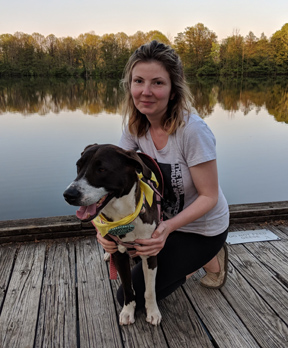!This story has an important update
Sarah Jones

Photo courtesy of Sarah Jones
Photographed with Briar Jane, one of her two dogs, Sarah Jones, a fourth-year veterinary student at The Ohio State University College of Veterinary Medicine, also loves cats. That's a big reason why she spearheaded a study on the use of unapproved drugs to treat cats diagnosed with or suspected of having FIP.
On an evening in late August, an Ohio woman drove to a gas station to meet someone she knew only from Facebook. She gave him $180 in exchange for needles, syringes and two unlabeled 5-milliliter vials filled with clear liquid. It was a drug deal with a twist: The buyer was a veterinarian trying to save her own cat's life.
The veterinarian was buying an unauthorized version of an antiviral agent that is not produced or approved in the U.S., but has been shown to reverse the progression of feline infectious peritonitis (FIP) in a clinical trial involving a couple dozen cats.
"I definitely had concerns with what I was doing," the veterinarian told the VIN News Service by email. She agreed to talk about her experience on condition of anonymity to guard against repercussions for using an unapproved drug. When her pet was diagnosed with FIP, a deadly viral disease, she said, "I was no longer a vet. I was an owner in distress and about to lose a kitten who had barely begun to live."
Upon the first injection, she saw the kitten improve. At that point, she said, "My concerns were gone. This was the only thing that made sense."
A growing number of people have reached the same conclusion. Over the past two years, unapproved antiviral treatments for FIP have made their way to cat owners worldwide, facilitated by online groups. On these same platforms, hundreds, possibly thousands, of people have reported that pets suspected of having FIP are bouncing back and showing no further signs of illness. The Ohio veterinarian has her own survivor testimonial: A month and half after completing 12 weeks of daily injections, her cat "is looking and acting amazing."
Dr. Samantha Evans

Photo courtesy Dr. Samantha Evans
A clinical pathology professor at The Ohio State University College of Veterinary Medicine, Dr. Samantha Evans researches multiple aspects of FIP. "I had my own kitten die of this disease," she said. "And so, I have a personal vendetta for that reason."
In August 2019, VIN News reported on the incipient grassroots effort to treat FIP cats with knockoff drugs made in China, centered around a private Facebook group known as FIP Warriors. At the time, the group had around 2,000 members. By the summer 2020, FIP Warriors reached 30,000 members. Last October, an FIP Warriors group for veterinarians was established. It has more than 6,000 members today.
The crowdsourced initiative has become a sprawling, extra-medical experiment on an internet plagued with pseudoscience and junk cures. It is a decidedly imperfect research universe. However, Sarah Jones, a fourth-year veterinary student at The Ohio State University College of Veterinary Medicine, and her clinical pathology professor, Dr. Samantha Evans, believe the groups' experiences are too important to dismiss.
During the summer, they surveyed 400 cat owners and 150 veterinarians who used or oversaw the use of unapproved drugs to treat cats diagnosed with or suspected of having FIP. They compiled the results to present a methodical exploration of what's happening with these unauthorized treatments, which, to their surprise, produced survival rates of 80% and better. Now with a draft of those findings in hand, their goal is to get the citizen science out to veterinarians in the more trusted venue of a peer-reviewed journal.
FIP in brief
FIP is thought to be triggered by mutations that occur in a ubiquitous and otherwise unimportant pathogen called feline enteric coronavirus (FECV). (One of hundreds of known coronaviruses, FECV does not infect humans.) The mutations enable FECV to escape mature epithelial cells in the lower intestine and infect a basic cell of the immune system, the macrophage. This macrophage-infecting virus is known as FIP virus, or FIPV.
Prospective FIP drugs may benefit from COVID-19 research
"About one in 10 cats exposed to this mutant virus will go on to develop FIP after a subclinical period ranging from days to a year or more," Dr. Niels Pedersen, a respected FIP researcher, told VIN News in 2019. "FIP is fatal in virtually all cases if left to run its normal course." It is considered the leading infectious cause of death among young cats in the care of foster homes, rescue organizations, shelters and catteries, and kills around 1.3% of cats worldwide, Pedersen said.
Early clinical signs of FIP include fever, loss of appetite, weight loss and depression. There is no single test that can diagnose every case of FIP with complete sensitivity and specificity. Diagnosis often is made through the sum of clues from history, clinical signs, physical exam and various tests including blood chemistry analyses and complete fluid analysis.
Many cats with FIP are euthanized. Others are given symptomatic treatment and supportive care on the hope, however slight, that the presumptive diagnosis is incorrect and the cat is suffering from non-FIP illness.
In the past few years, two targeted antiviral therapies, GS-441524 (patented by Gilead Sciences) and GC376 (patented by Kansas State University), reportedly have cured FIP in some cats. Gilead made headlines last year with remdesivir, another antiviral compound that is closely related to GS-441524, which was the first drug approved by the U.S. Food and Drug Administration as a treatment for COVID-19.
Generally referred to as GS and GC, the agents are small molecules that, when injected into the body, interfere with the virus' ability to hijack immune cells. GS inhibits the formation of viral RNA, while GC inhibits the formation of viral proteins. To date, trials have shown GS to be the more effective of the two, but Gilead so far has not taken steps to obtain approval of the drug as a treatment for FIP (see sidebar). In the void, multiple manufacturers, mostly in China, are synthesizing GS, according to members of the group FIP Warriors.
A class in veterinary ethics opens a door
Research by Jones, the Ohio State veterinary student, began with an offhand conversation in spring 2019. A friend was describing a communications class on ethics in veterinary medicine that Jones had missed. She told Jones that she'd asked about the ethics of the unapproved treatment for FIP.
"I stopped her there," Jones recalled. "And I said, 'Wait. What treatment for FIP?' "
The friend clued her into the existence of FIP Warriors. A former veterinary technician and a dedicated cat lover three years into veterinary school, Jones knew about FIP but was, to her amazement, completely unaware that there was a treatment.
"It's kind of crazy to me; and even crazier is that a lot of the clinicians and especially the [veterinary] residents at Ohio State, at least when I mention it, they're not aware of it," she told VIN News.
Jones requested and was given access to the FIP Warriors Facebook group. She said she followed the posts for nearly a year.
"I kept watching these people post these miraculous stories," she said. They posted photos and videos of very sick kittens and described dire signs of illness. They shared their pets' test results. Group administrators and experienced members would offer advice and help them buy drugs from China and elsewhere. Many owners followed up with tales of recovery and new photos.
"The pictures were like night and day," Jones said. The dramatic results were not what she expected. "You always hear these stories and cringe, about owners hearing something on Facebook … or reading something on the internet, they bring you this information, and it's ridiculous," she said. "But FIP Warriors were different. Pet owners with cats that were 100% going to die found the people on this page and, more often than not, their cats survived."
She began developing a plan to take a more rigorous look at what the FIP Warriors were doing. She was casting about for a faculty partner when she started an online clinical pathology rotation with Evans in July.
Evans studied virology for her doctoral dissertation and lost a cat, a sweet, polydactyl calico named Mercury, to FIP in 2016. She is currently involved in research to develop a diagnostic test for FIP, and she frequently speaks about the disease to her students.
During office hours over Zoom, Jones pitched her idea to Evans. Like Jones the year before, Evans was astonished to learn that there were effective treatments for the disease.
"I almost fell out of my chair," Evans said. "The fact that people were trying it didn't surprise me so much. The fact that it was working was just unbelievable and so awesome. People are saving FIP cats, which was unheard of as of two years ago."
Evans followed Jones in poring over the Facebook group posts. "One thing that really motivated me was a post that I saw, and I saved it. It said, 'I don't feel like a warrior. I feel like a failure. I need a veterinarian,' " she remembered. "It really touched me because I was like, 'Yeah. Some of us go to school for eight years to learn how to inject animals with a drug. We should be the ones doing it. We should be there to help people, and we're not because we can't.' "
Evans and Jones decided to formally study the FIP Warriors cases. They enlisted administrators of FIP Warriors groups to ask participants to answer surveys about treating their cats. In addition, some participants have provided lab and blood test results.
The urgency of gathering and preserving the treatment histories for these cats was highlighted in August, when Facebook shut down the 30,000-plus FIP Warriors page with no warning and for no stated reason. Detailed discussions of hundreds of cases evaporated overnight.
An FIP Warriors group administrator told VIN News about the issues with Facebook. She requested anonymity because, she said, she has been threatened and harassed for her role in promoting illicit GS.
After FIP Warriors' first page was removed by Facebook, the group created a replacement page, only to see that removed, as well — repeatedly. Now on its fourth page — counterintuitively identified as FIP Warriors 5.0 — the group has only about 800 members. The group no longer hosts detailed discussions about cases, out of concern that something in those posts provoked the shutdowns. Instead, the page serves strictly as a portal for contact. Owners faced with an FIP-positive or -suspected kitten post questions or ask for help. Follow-up assistance happens through private, direct channels.
A spokesperson for Facebook was not able to confirm any details concerning the FIP Warriors group pages in time for publication.
Scientific rigor meets internet phenomenon
The survey from Jones and Evans was designed to plum the factors associated with successful treatment. The researchers are looking at side effects, complications and success rates of various brands. They are also evaluating routes of administration (pills versus injections), timing of intervention, dosing and differences in effectiveness depending on the form of FIP.
FIP manifests in wet and dry forms. Cats may initially present with one form and later develop the other. In wet FIP, fluid resulting from inflammation accumulates, most commonly in the abdomen. In dry FIP, the cat develops multiple small granulomas (tumor-like lesions) in the abdomen, thorax, eyes (ocular disease) and/or brain (neurological disease). Cats with neurological FIP may develop a lack of coordination, seizures and dementia. Ocular disease can cause inflammation, discoloring or clouding of the eyes, impairing vision.
The researchers also hope to explore whether FIP has any lasting impacts on survivors. "Remember, before this, nobody ever survived," Evans said. "We don't know if … FIP can resurface. We don't know if there can be long-term kidney damage."
Evans and Jones concede their research is following an unconventional track, in part because the treatments are following an unconventional track.
"This is all coming about … in a different way than medical therapy usually progresses," Evans said. It is more usual to begin with an idea, followed by a small trial, which, if successful, is followed by a bigger trial that tests for efficacy and safety, she said. A recent example, in sped-up form, is the development of COVID-19 vaccines.
As a result of the unconventional path of the FIP treatments, the study data has what Evans calls "issues." For example, the majority of the surveys rely on owners' memories of emotionally trying experiences that may have happened more than a year ago. The feedback is also likely biased toward survivors. Jones postulates that owners whose cats do not survive are probably less likely to stay in the group and participate in the survey.
That said, Evans adds: "It's the only data that's been collected. I think the veterinary community is going to be astounded and impressed."
'Not a fluke'
A data analyst hailing from the human health world — where prospective, randomized, double-blind studies are the standard for research — has seen the data and thinks it needs to be disseminated.
Wendy Novicoff, a professor of orthopedic surgery and public health sciences at the University of Virginia School of Medicine, said at first she thought it was the sort of study she might not accept as a peer reviewer for a human medical journal.
"There are all kinds of problems with the data. It's going to be biased, etc.," she said. "But when you go from 100% fatal to not fatal, I can live with some bias in the data."
Novicoff learned about the study when she was surveyed through FIP Warriors. She lost three kittens to FIP early last year. When a fourth stopped eating and developed a fever in July, she knew signs pointed toward FIP. Feeling like she couldn't endure another death, she turned to the Facebook group. Within 36 hours, she said, she had everything she needed to begin treatment for 4-month-old Tawny.
Her veterinarian demonstrated proper injection technique while giving Tawny a routine vaccination, although Novicoff said she never got used to her kitten's pained reaction. She switched to a pill form of the medication after a few weeks. An FIP Warriors administrator helped her adjust dosages as her cat put on weight during the 12-week regime. Tawny is doing well today.
Wendy Novicoff

Photo by Gregory O. Harris
Wendy Novicoff, a professor of orthopedic surgery and public health sciences at the University of Virginia School of Medicine, helped compile the data for the FIP Warriors study. She lost three kittens to FIP last year. A fourth named Tawny got sick in July but is recovering after receiving injections of unapproved drugs. “The biggest thing that I’ve learned is that there is hope," she said.
Novicoff is also on the faculty of the School of Data Science at the University of Virginia and finds data cleanup relaxing. She offered to assist Evans and Jones in pulling together their data.
She said she understands why veterinarians can't be involved with treatment. But when pet owners come to the FIP Warriors page and say their veterinarians are telling them euthanasia is the only option, she said, that's wrong.
"If anything can come out of this, it's [that] there really, truly, is hope," Novicoff said. "We have enough information now. It's not a fluke."
Veterinarians face a host of decisions when faced with an FIP diagnosis, not merely whether to tell owners about the unapproved treatments. More and more, they may be asked to provide support for kittens that are being treated by their owners. Should they?
Addressing that question was a key motivator for Jones. She wondered what she would do in that situation. How would she know what to recommend?
"Veterinarians have no idea even how to begin to bridge this conversation," she said. "I'm not advocating for breaking the law. I'm just trying to put the information out there as far as what happens to these cats. What are the side effects? What are complications? What's expected? And what percentage of these cats are actually surviving?"
Jones, who finished drafting the paper during the Christmas break, hopes it will be the first of a series that follows the progress of the do-it-yourself treatments. And she doesn't plan to stop there.
She also wants to be involved in the first large-scale clinical trial of this treatment when and if it happens. "That's my ultimate goal at this moment," she said.
Update: Dr. Samantha Evans, Dr. Sarah Jones and Wendy Novicoff’s research was published July 30, 2021, in the peer-reviewed journal Animals. Unlicensed GS-441524-Like Antiviral Therapy Can Be Effective for At-Home Treatment of Feline Infectious Peritonitis is available at no cost.
This story has been edited to clarify that FDA approval of remdesivir in October 2020 was not on a limited, emergency basis.